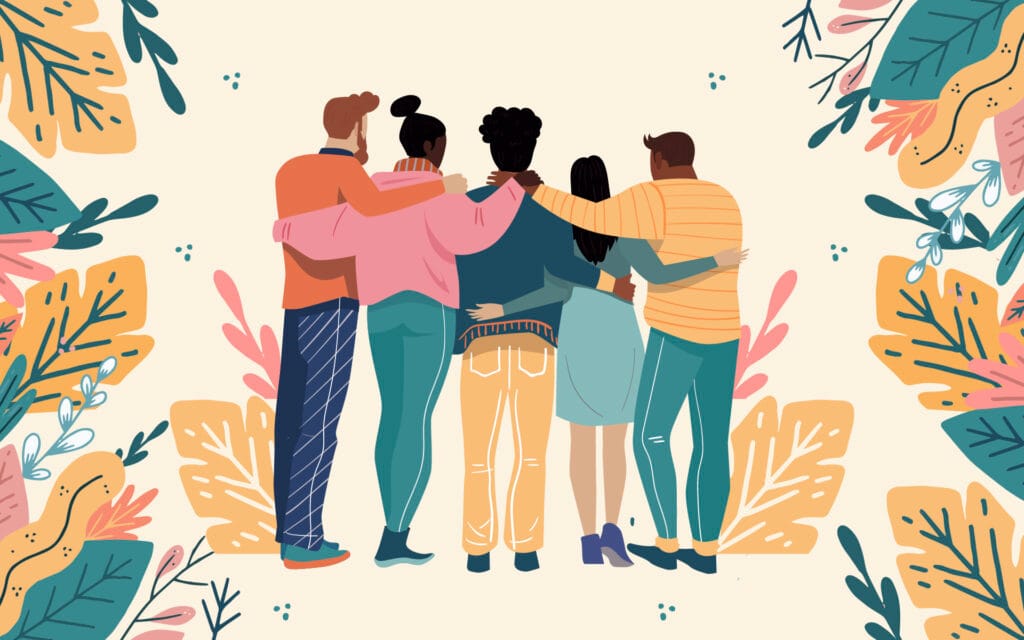[ad_1]
How mindfulness can help us all in racial therapeutic and coming along with compassion, studying, and unlearning.
Welcome! This text is a follow-up to our sequence on Mindfulness for Racial Therapeutic by healer, chief, and one of many 2021 Highly effective Ladies of the Mindfulness Motion, Tovi Scruggs-Hussein. Discover the remainder of the sequence here.
1. Are you able to say extra concerning the function of meditation in racial therapeutic? Meditation seems like a person well-being observe. What’s its function on this context?
Our society has branded meditation to be a person well-being observe, however we even have the choice to have interaction in meditation as an act of service. Initially, sure, mediation can create a way of particular person well-being, but it’s also a device for liberation and empowerment. We’ve continued to see within the analysis that meditation helps empathy and compassion; these are each qualities and methods of being that transcend private well-being and really help the best way we have interaction with others and ourselves, not a lot as a result of we really feel good, however as a result of we now have the capability and competence to have interaction from a extra heartfelt place. Racial therapeutic depends upon empathy and compassion. In an effort to heal, we should be taught to hook up with the feelings of racialized experiences and take motion primarily based on these feelings to create a extra simply and liberated society. Meditation helps racial therapeutic and racial therapeutic helps justice, every constructing on the opposite.
In an effort to heal, we should be taught to hook up with the feelings of racialized experiences and take motion primarily based on these feelings to create a extra simply and liberated society.
2. In your “Mindfulness for Racial Healing” article, you write concerning the significance of honoring our connection to ourselves so as to honor our connection to one another. What does that imply? Why does honoring our connection to ourselves come first?
Racism is an indication of disconnection to ourselves and to others. In truth, the entire “isms” are an indication of deep disconnection from our compassion and of the shortcoming to see our shared humanity. Once we are disconnected from that sense of humanity, it’s simpler for us to dehumanize others. Racism is dehumanization. The atrocities of slavery and genocides stem from this sense of disconnection. As soon as we’re linked to ourselves, we are able to deepen our connection to others, but it surely doesn’t occur except we connect with ourselves extra deeply first. Your embodiment of compassion and mindfulness first will get engrained in your self after which it’s felt outward.
Meditation and its significance in racial therapeutic additionally connects to nonjudgment—and by definition, a part of meditation is the observe of nonjudgment. Once we are in a state of working towards nonjudgment, we could be extra equanimous and never put issues or folks, together with ourselves, into classes of “proper or mistaken” or “good or unhealthy.” Once you deepen your connection to your individual value with out judgment, you’ll be able to start to do the identical for others. Neuroscience supports this progress as a competency that’s constructed over time as you deepen your meditation observe—and we should at all times start with self, beginning inside. Contemplate the great quote by Gandhi, “Be the change you want to see on the earth.” You should embody it first.
3. You discuss concerning the significance of understanding. Can a White individual ever actually perceive the expertise of a Black, Indigenous, or Individual Of Colour (BIPOC)? For allies, does that matter?
I like this query! And I like that I didn’t need to grapple with responding to this one alone—I’ve devoted, racially-conscious White allies within the work who took the lead on responding:
Sally Albright-Inexperienced, a pacesetter in Racial Therapeutic Allies gives this:
White folks can and ought to be concerning the enterprise of actively listening to the voices of BIPOC, centering these voices in any conversations about systemic racism and anti-racism and dealing exhausting to know. In the long run, it’s essential to shift the main target from phrases like “ever” and perceive the character of lived expertise. Can anybody ever really perceive the experiences of one other?
We’re all nonetheless unlearning the issues we have been socialized to consider about racism and studying the truths we have been by no means taught.
We’re all nonetheless unlearning the issues we have been socialized to consider about racism and studying the truths we have been by no means taught. Changing into a White ally actually includes asking different types of questions primarily based on years of working exhausting to be taught concerning the world via the lens of somebody who shouldn’t be White. Understanding what it means at a deep stage to be White—and the impression white dominance and oppression have had on BIPOC—is the understanding that White allies work in direction of. When that deep stage of cultural humility is reached, then one can say a White individual has grow to be anti-racist and works to know the historical past of racism to allow them to interrupt it in our techniques and practices. When one can really work beside BIPOC to interrupt racist practices, and exhibit that they’re motivated to work exhausting for the nice of humanity, recognizing the depth and breadth of BIPOC struggles past a standpoint of white saviorism, then they are going to be shut. It’s about recognizing that the work is extra about studying the information and dealing exhausting to restore the harm than it’s about understanding what it’s wish to be a BIPOC.
Grace Helms-Kotre, a pacesetter in Racial Therapeutic Allies, gives this:
A White individual won’t ever totally perceive what it means to be a Individual of Colour. That’s not the purpose. It’s not like a field we are able to verify or a competency we are able to obtain. We’ll by no means have the lived expertise of being focused by systemic racism, so we can not know totally. However we are able to have interaction within the lifelong observe of deepening our understanding by bringing presence and empathy to our interactions with BIPOC and with different white people. To convey consciousness to our racial experiences and systemic racism because it features in each space of our lives.
For allies, what issues is that we’re displaying up with curiosity and humility many times.
For allies, what issues is that we’re displaying up with curiosity and humility many times. We aren’t going away. We’re staying within the discomfort of racial consciousness in an effort to problem White supremacy tradition in all its manifestations, via us and round us.
4. What does cultural-responsiveness imply? The place does mindfulness come into play right here?
Cultural-responsiveness means: working towards studying from, valuing, and referring to folks from totally different cultures with respect. To take it a step additional, I view it as having an consciousness and skill that enables us to have interaction with and honor the backgrounds, values, customs, and norms of teams totally different than our personal. Once more, this may be utilized past race. Meditation and mindfulness help us in rising our consciousness of ourselves, others, and our impression. Meditation and mindfulness invite us to observe pausing earlier than responding in order that our response could be skillful slightly than habituated. The observe shouldn’t be permitting our triggers to grasp us, and connecting to others from a spot that honors who they’re. My coronary heart swells with gratitude for a observe that may be performed in each isolation and group to supply deep particular person well-being in addition to deep connection in order that the way forward for humanity is held in love.
[ad_2]
Source link

